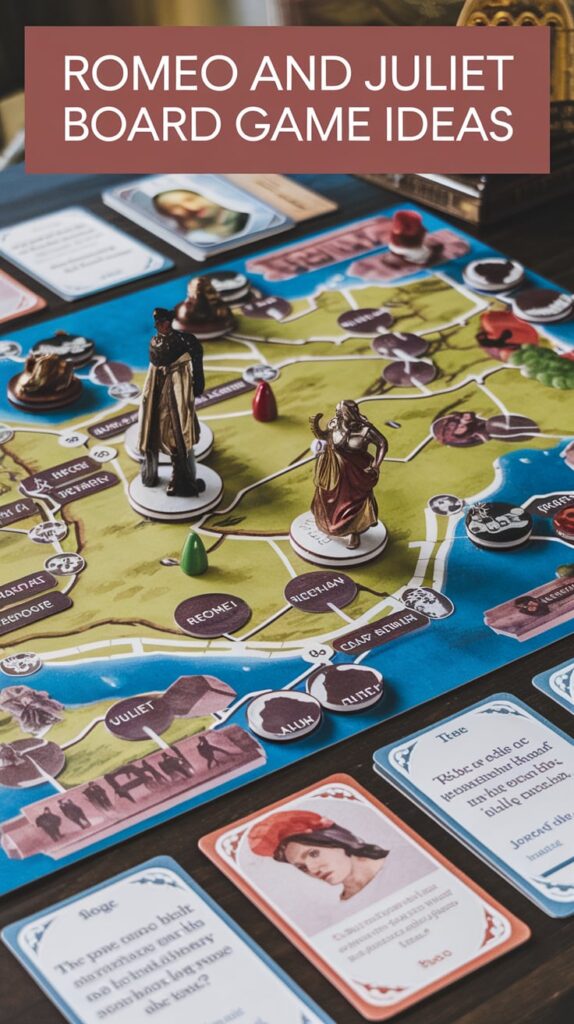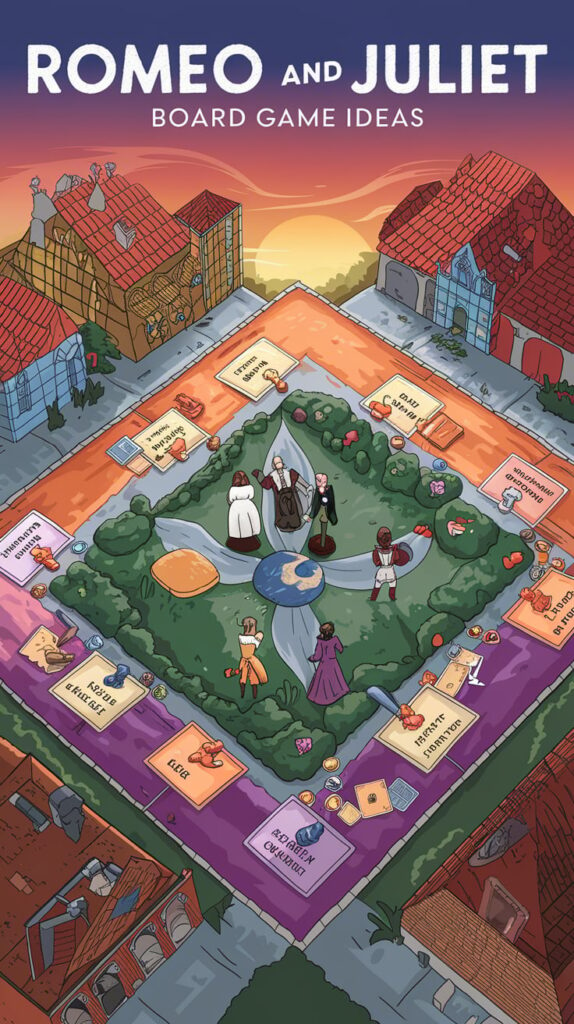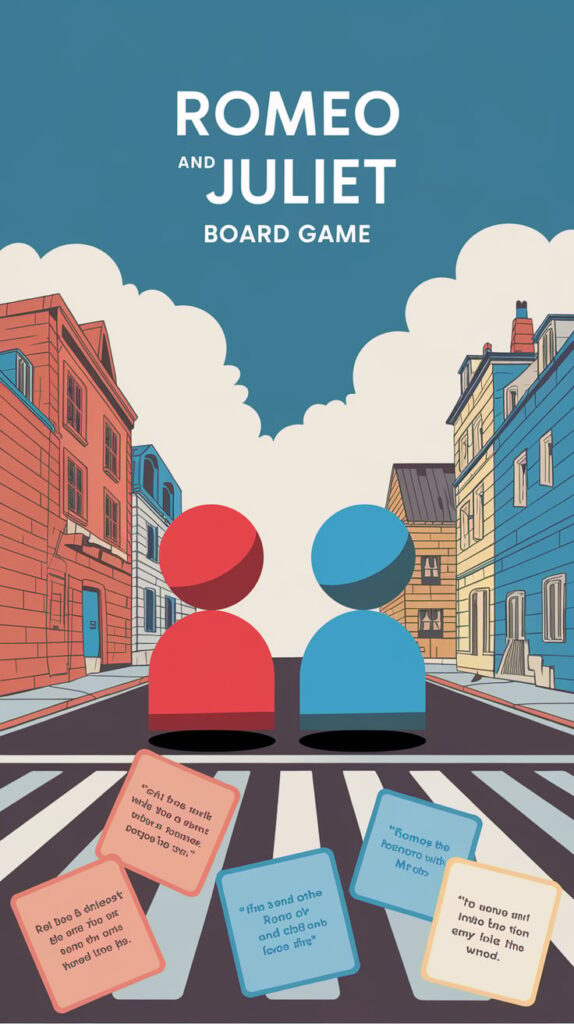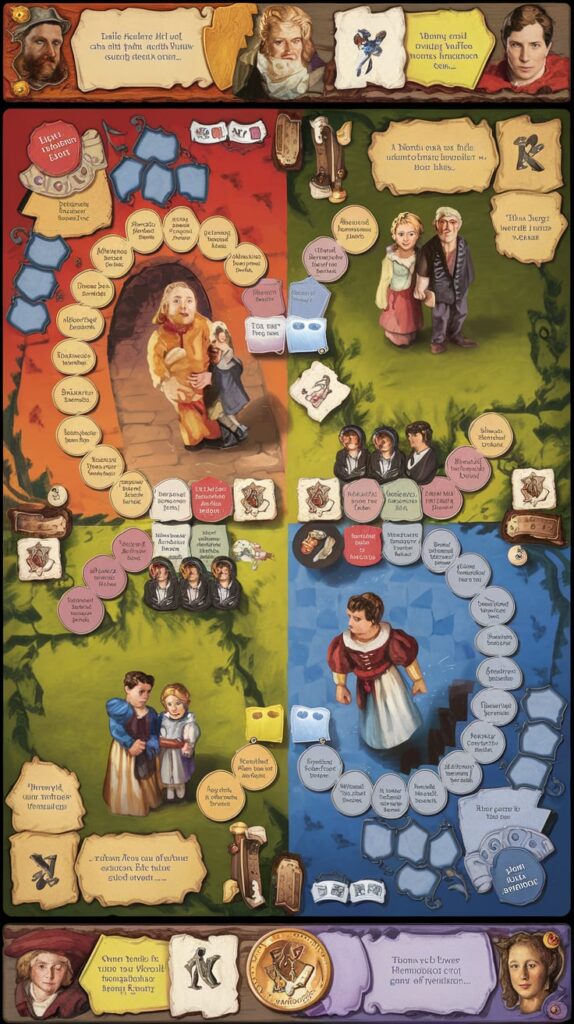Romeo and Juliet board game ideas offer a fun, interactive way to bring the classic Shakespearean play to life in a new, engaging format. Players can immerse themselves in the world of Verona, taking on the roles of the iconic characters—Romeo, Juliet, and others—while navigating through pivotal moments of the story. The game could be a strategic challenge where players must complete quests such as delivering secret messages, avoiding family members, or planning a secret rendezvous. With various obstacles and plot twists inspired by the play’s events, such as feuding families or misunderstandings, the game would require careful decision-making and teamwork.
Creative elements, such as role-playing and scenario-based gameplay, would allow participants to experience the tragic romance in a fresh way. With unique character abilities, a shifting game board representing Verona, and mini-challenges tied to the play’s famous scenes, a Romeo and Juliet board game could be both a tribute to the timeless story and an exciting, thought-provoking game for fans of literature and board games alike.
Romeo and Juliet Board Game Ideas
A Romeo and Juliet board game would be a fun, interactive way to bring the Shakespearean tale to life. Players would immerse themselves in the story of the two star-crossed lovers, navigating through key events, building alliances, avoiding obstacles, and making decisions that can impact the game’s outcome.
Game Objective:
The objective of the game is for players to experience the events of “Romeo and Juliet” and ultimately guide Romeo and Juliet toward their secret rendezvous while overcoming challenges posed by their feuding families.
List of Requirements:
- Game Board:
- A game board depicting key locations from the story (e.g., Verona streets, Juliet’s balcony, Capulet’s house, Montague’s house, the Friar’s cell, etc.).
- Pathways that connect locations and represent different scenarios from the play.
- Character Cards:
- Cards for each character (Romeo, Juliet, Mercutio, Tybalt, Nurse, Friar Lawrence, etc.) that describe their strengths, weaknesses, and abilities.
- Players can draw these cards when they land on specific squares or situations.
- Event Cards:
- Cards that introduce random events or decisions, such as “Tybalt challenges Romeo,” “The Capulet party,” or “Romeo and Juliet meet secretly.”
- Some events will help the player, while others might create obstacles.
- Dice:
- A six-sided dice to determine the number of steps a player moves on the board.
- Character Tokens:
- Tokens representing the characters each player controls (e.g., a Romeo token, Juliet token, etc.).
- Players move these tokens across the board based on their dice roll.
- Love Tokens:
- Tokens representing the growing love between Romeo and Juliet.
- Players collect these tokens as they successfully navigate through the game. The more love tokens they collect, the closer they get to winning the game.
- Challenge Cards:
- Cards that present obstacles like “Family Feud,” “Unfortunate Timing,” or “Messenger Lost.”
- Players must overcome these challenges through strategic moves, using character strengths or event cards.
- Timer or Hourglass (Optional):
- A timer for certain timed events or challenges, adding a sense of urgency as players make decisions.
Step-by-Step Guide to Playing the Game:
- Setup:
- Place the game board on a flat surface.
- Shuffle the event cards and challenge cards and place them in their designated spaces.
- Each player chooses a character (Romeo, Juliet, or other key characters) and takes the corresponding character token and character card.
- Distribute 3 Love Tokens to each player.
- Decide who goes first by rolling the dice.
- Gameplay:
- Movement: Players take turns rolling the dice to move their character token along the board. The number rolled on the dice indicates how many spaces they can move.
- Land on a Location: When a player lands on a location (e.g., Capulet’s house, Friar’s cell, or Juliet’s balcony), they may draw an event card or perform a specific action associated with that location. For example, landing on “The Capulet Party” may require the player to draw an event card, which could introduce a twist such as “Tybalt recognizes you and challenges you to a duel.”
- Family Feuds & Obstacles: Whenever players land on specific spots marked with family symbols (Montague or Capulet), they may face challenges like duels or misunderstandings. Players can attempt to overcome these obstacles with event cards, character abilities, or by rolling the dice to determine their success.
- Love Tokens: Some locations or events reward players with Love Tokens when they make the right choices, such as successfully sneaking out for a secret meeting or helping Juliet avoid an arranged marriage. Love Tokens are crucial for winning the game, as they represent the growing bond between Romeo and Juliet.
- Special Events: At any point, players may draw an event card, which will either help or hinder them. For example, “Romeo and Juliet meet secretly,” which can advance their progress, or “The Capulets are on the hunt!” which could delay them for several turns.
- The Secret Rendezvous:
- The ultimate goal is for Romeo and Juliet to meet at the Friar’s cell or another romantic location. To get there, players must overcome several challenges and collect enough Love Tokens.
- As players approach the final stages, they will need to work together to find a way to be reunited without being caught by their feuding families.
- Winning the Game:
- The first player to successfully bring Romeo and Juliet together (or the team of players who navigate the most challenges and collect the most Love Tokens) wins the game.
- If playing in teams, the team that reaches the final rendezvous with the most love tokens collected wins.
Optional Variations:
- Timed Mode: Use a timer to set a time limit for certain actions. If the players do not meet their objectives in time, they face additional consequences (e.g., losing Love Tokens).
- Competitive Mode: Players can try to sabotage others by using event cards to hinder their progress or steal Love Tokens.
- Cooperative Mode: Players work together to get Romeo and Juliet to meet without being caught. Success is shared, and all players win or lose together.
A Romeo and Juliet board game is an exciting way to explore the themes of love, fate, and conflict while having fun with friends or family. The game’s mix of strategy, decision-making, and thematic storytelling keeps players engaged and invested in the outcomes of their actions, all while remaining true to the spirit of Shakespeare’s classic play.




